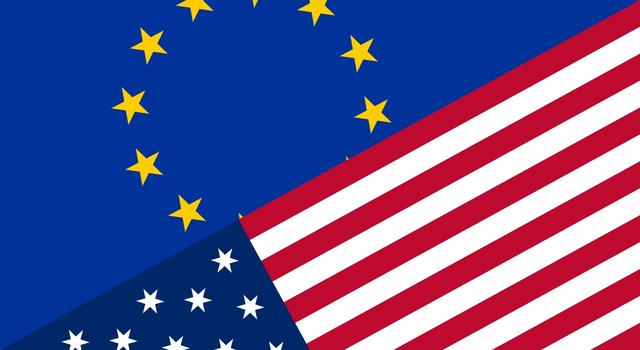TTIP reactivated? US-EU trade deal back on the table
Do you remember TTIP? Trade deal between the US and the EU to be negotiated until 2016? It was supposed to revive the European economy, open the American market to EU companies, create new jobs, and all with care for sustainable development, i.e. ensuring the protection of workers' rights and the environment. Critics of TTIP pointed out that the tariffs are already low and that additional reductions will bring little benefit, and that the real purpose of the agreement will be to expand the influence of corporations on states and on decisions made by democratic authorities, including through the ISDS (investor versus state) mechanism. It made it possible for corporations to sue countries to an arbitration court in a situation where a change in the law, beneficial, for example, for citizens, meant the loss of planned profits for companies. There were also fears of flooding the European market with cheap food from the US, lowering phytosanitary standards, a decrease in the number of jobs, a threat to the security of personal data and changes in public services (health, education or water supply). The main objection was also the lack of transparency of the negotiations. In May 2016, Greenpeace released excerpts from the document. On the wave of social indignation, another agreement - CETA (between Canada and the EU) - consequently removed the ISDS mechanism (whether it will be replaced by ICS remains to be seen), then Donald Trump became the president of the USA and talks on TTIP died down.
AdvertisementSome prophesied it would be forever. Others, e.g. prof. Leokadia Oręziak from the Warsaw School of Economics, on the contrary, explaining in 2016 in an interview with gazetaprawna.pl that TTIP is not in contradiction with Trump's plans, and the agreement may be beneficial for American companies, so the negotiations will not be stopped forever. Trump will want to get something on her.
The time has come. After three years, we return to the topic. Whether it will be TTIP 2, as some say, is difficult to say - both negotiating sides deny that it is intended to be a simple continuation of work. The European Commission assures us that this is a completely different type of deal.
Published in January this year. negotiating goals of the USA, required by Congress in the so-called Fast Track Negotiations is a document covering a long list of areas around which talks between the United States and the European Union are to take place. It includes e.g. issues such as customs and trade facilitation, elimination of non-tariff barriers, removal of "unnecessary differences in regulations", full negotiations on agriculture, striving to "ensure that products are not discriminated against by government regulations on the basis of nationality or territory in which they are produced (this is a about Google's tax plans and others). Among the negotiating goals, the US also included trade in services, intellectual property issues, labor issues, environmental issues, defending the interests of American creators, entrepreneurs and farmers, rules of origin, geographical indications, trade in pharmaceuticals and medical devices, and many, many others, including a point on relations U.S. and Israeli trade unions.
- This document is a collection of pious wishes that the Trump administration would like to achieve, says Dr. Paweł Kowalski from the Faculty of Law in Warsaw at the SWPS University. - On the part of the US, it is an attempt to maintain asymmetric access to the market. Also agricultural. These provisions suggest that the EU should, in principle, remove all barriers, while the US will leave itself options that exclude certain provisions, for example, regarding anything related to the security of the country.
- The American guidelines are amazing to me, says Marcin Wojtalik from the Institute of Global Responsibility. - The US requiring EU countries to sign the World Labor Organization Convention to respect the minimum wage, while the US government has not signed key International Labor Organization conventions or adopted the Decent Work Agenda is surprising to say the least. Equally interesting is the section on environmental protection, which reminds us that environmental rights are to be enforced in the same way as all other provisions of this agreement. However, the problems with caring for the environment in the USA are much bigger than in the EU.
As Marcin Wojtalik says, perhaps there is some negotiating strategy in this or the effect of a deal between the Democrats and the current administration, assuming Congress's support for Trump's mandate for negotiations, provided that he makes such declarations.
Léa Auffret, an expert on trade at The European Consumer Organization (BEUC), also points out the excessive scope of negotiations in an interview with gazetaprawna.pl. - The new EU-US trade negotiations should be different from the TTIP negotiations of the past. What the EU wants is the removal of tariffs on "manufactured goods", which apply to all non-agricultural goods. Consumer groups are in favor of trade negotiations leading to lower tariffs, explains Léa Auffret, because people can benefit from potentially lower prices and a greater choice of products. What we do criticize, however, is the fact that trade negotiations are trying to establish rules that apply to almost all areas of economic life.
It's hard to disagree with this opinion. The range of goals is vast and far exceeds what was agreed in July 2018, when during the Trump-Junker meeting it was agreed that the talks would focus only on selected areas, mainly on resuming talks on lowering tariffs on industrial goods, including cars (Trump promised not to introduce 25 percent duty on them) and the rules for buying American soybeans by the EU. The willingness to reduce non-tariff barriers and increase trade in services, chemicals, pharmaceutical products and medicinal products was also declared. In addition, the European Union would import more liquefied natural gas (LNG) from the United States.
Why is Trump going beyond these arrangements? "Submitting negotiating targets to Congress is an internal US procedure within the Trade Promotion Authority, which the EU does not want to comment on," reads the European Commission's response to gazetaprawna.pl's request for comment. And further: "The July (2018 - ed.) statement agreed by both presidents is clear. According to this statement, the EU is ready to negotiate the abolition of industrial tariffs. Separately from trade negotiations, we are also discussing regulatory cooperation in many sectors with the US, as well as compliance assessment and industry standards. Note that both presidents have agreed in this joint agenda to focus on a limited range of areas where results can realistically be achieved quickly and without entering areas of significant sensitivity for either side. Therefore, for example, the joint program does not cover agriculture - which is a sensitive area for the EU side, or public procurement - which is sensitive for the US, the press service of the European Commission informs us.
In January, the European Commission also adopted proposals for guidelines for trade negotiations with the United States. One mandate concerns the establishment of the so-called conformity assessment, which aims to remove non-tariff barriers, which would make it easier for companies to demonstrate that their products meet the technical requirements on both sides of the Atlantic. The second is the abolition of tariffs on industrial products, excluding agricultural products. The EU also wants to focus on closer regulatory cooperation in sectors such as pharmaceuticals and medical devices.
"Unnecessary differences", "regulatory compliance", "scientific evidence"
In a published document, not only the thematic scope is important. Documents concerning commercial contracts should be read also (or perhaps above all) between the lines, bearing in mind the semantic nuances.
In the phrase "unnecessary differences in regulations", the key word will then be "unnecessary". From the US point of view, many EU differences may be "unnecessary". In turn, "promoting greater regulatory compliance, including through legal regulations" is an opportunity to influence the shape of European legislation. If the issue is about "removing unjustified non-tariff barriers blocking exports", then in the language of trade liberalization, there may be grounds for a company to question virtually any state or EU legal regulation and demand damages. Some of the "barriers" are, for example, phytosanitary standards, the purpose of which is to maintain the proper quality of goods. When talking about sanitary and phytosanitary issues, based on "WTO rights and obligations, including with regard to science", this is questioning, for example, the European Reach Directive, based on the precautionary principle (it is about proving the harmlessness of a chemical substance that has be placed on the market). "Unreasonable trade requirements (including labeling) that affect new technologies" is nothing more than a veiled ban on informing customers about the GMO content, because according to the American side it is unfair competition and discrimination. "Secure comprehensive market access for EU agricultural commodities by reducing or eliminating tariffs and eliminating practices" means that the controversial topic of opening the agricultural market to the US may return to the negotiating table.
Trump on TT: Like I said: I'm fighting for YOU!

Severely strained trade relations with China translate into serious problems, e.g. in agriculture. Relations with the European Union are also - to use a euphemism - not perfect. On top of all of this comes the US presidential election, so it's time to make some promises. - Trump, referring to the trade war between the US and the EU, scares and gives carrots - assesses Marcin Wojtalik from the IGO. And he immediately adds that both sides are actually behaving in this way to show voters that it is not only about confrontation, but also about giving each other a chance to create something. The American side wants talks on agriculture (Commissioner Malmström assures that it is absolutely impossible), the EC is afraid of tariffs on cars. The most important thing for Trump is that he can show at home that he cares for American workers, Wojtalik concludes.
Also, Dr. Paweł Kowalski from the SWPS University is inclined to the thesis that the document with negotiation objectives is a strong entry into the election campaign of Trump, who will want to show that he is in favor of an agreement with the EU, but on American terms. - You have to look at the time context, because this document comes at a very difficult time for Trump. It needs to show that it is still open and wants to protect the market. Dr. Kowalski draws attention to one of the fragments of the document, which, according to him, particularly shows the political character of this text. These are the General Provisions, which prohibit any kind of action that would undermine trade agreements between the US and Israel.
What if these are the ghosts of TTIP and not just Donald Trump's election campaign?
Marcin Wojtalik from IGO admits that for the time being the document resembles a TTIP agreement, a kind of TTIP 2, although with broken teeth, but he is aware that we are at the stage of a declaration of intent and it is difficult to judge anything more now. Perhaps not necessarily the entire compromise will be included in the trade agreement itself, perhaps it is also a gentlemen's agreement, so some of the declarations will not be recorded.
Mute Schimpf, trade specialist at Friends of the Earth Europe, has no illusions. On foeeurope.org you can read his opinion: "The position of the US Congress brings us closer to reviving the very unpopular TTIP agreement."
Agriculture - I check
One of the most controversial areas of the TTIP negotiations was the issue of opening the EU market to US agricultural production. This industry was excluded from the current talks by the arrangements of July 2018, but nevertheless the provisions concerning it were included for negotiation purposes. Why?
Chuck Grassley, the top U.S. trade policy senator, recently said that the president is leaning towards imposing tariffs on car imports in hopes of forcing Brussels to further open up the EU market to U.S. agricultural products. And because Europe is afraid of US tariffs on cars, it can be an "instrument for negotiations on agriculture." It is also significant that American farmers are one of the important groups among Donald Trump's voters.
Dr. Paweł Kowalski also does not rule out the possibility of talking about agriculture. - It must be remembered that before negotiations are carried out, it is always necessary to build a negotiating position - he reminds. - I am convinced that agriculture will appear somewhere. Let us remember that what e.g. what we are looking for as the EU is food security. Today, the EU is able to feed itself, but American food would be an additional source. Kowalski is convinced that we will not run away from the subject, although of course you will have to control what goes to Europe, because it is no secret that the US abuses various means.
Data security
In addition to agriculture, the issue of data security is back on the negotiating table. Will our data be safe? This was feared in previous negotiations, but this was before the GDPR. Experts are convinced that there are no threats in connection with the new agreement in this area. RODO (GDPR) also applies to entities from the USA (if they process data of people from the EU) and in this respect they cannot count on relief. According to Polish experts, it is rather safe and it is hard to imagine that the new version of the agreement would change the standards contained in the GDPR regarding the transfer of data to third countries.
- The EU made it clear in January 2018 that our data protection rules are not up for discussion in trade negotiations. So, if you look at the political reality, we don't think we should be afraid of a threat at this stage,' explains Léa Auffret from BEUC in an interview with gazetaprawna.pl. “However, we must stress that the EU-US negotiations are only part of the trade puzzle. It was recently announced that both the EU, the US and 74 other members of the World Trade Organization (WTO) are planning trade negotiations on "e-commerce". Nowadays, "e-commerce" is usually understood as cross-border online shopping, although in this case it refers to digital commerce in general. Topics like cybersecurity, algorithms, data protection are still fresh topics, we can't guess what might happen. However, we would like to avoid trade talks deciding how the EU or its Member States should regulate every digital topic, especially since some of them lack state-of-the-art legislation. On data protection, we expect the EU to put its 2018 position into practice and not put it on the negotiating table. I am sure that consumer groups will closely monitor the negotiations in this area - assures Auffret.
Dangerous regulations
Dr. Kowalski reassures that regulatory issues do not pose a threat. - However, the process of creating legislation is secured with us - he assures. The US will certainly want to support its companies and make no secret of this protectionist approach, but the EU as a whole is a really very strong partner.
However, the main reservation of the critics of this point is the EU's obligation to publish drafts of new regulations, i.e. in fact inviting entities from the USA, e.g. companies, to the process in the European legislative process. Marcin Wojtalik is afraid that if they are to have the right to access information and participate in consultations (the document even contains precise wording of what this would mean), it means that this is a real entitlement for US entities to participate in the European legislative process. And that is dangerous.
Corporate Europe Observatory also writes that "regulatory cooperation" would mean, for example, loosening standards in many areas, referring to a document that was allegedly leaked in October 2018 from the European Commission. It says the talks could cover many areas, from medicines to EU food safety rules (including the controversial GMO food and hormone-treated beef). Regulatory cooperation has been one of the most opposing aspects of TTIP. It ran the risk of introducing serious obstacles to anything that would go against the interests of multinational corporations in EU and US legislation, to the detriment of environmental and health protection. The American Chamber of Commerce once called regulatory cooperation a "gift that keeps on giving" to big business - reminds Corporate Europe. And writes that business, as before, still willingly visits the EC. This was revealed in internal documents that the European Commission published in response to a request under the EU right of access to information. In the four months following the Juncker-Trump meeting in July 2018, officials in the Commission's trade department discussed transatlantic trade with external stakeholders in 49 closed meetings. Only five of these meetings (ten percent) were with trade unions, communities and consumer groups. The remaining 90 percent were for companies such as US-based pharmaceutical giant Eli Lily, US agribusiness corporation Bunge and German company Volkswagen, and European employers' federation BusinessEurope and the American Chamber of Commerce.








